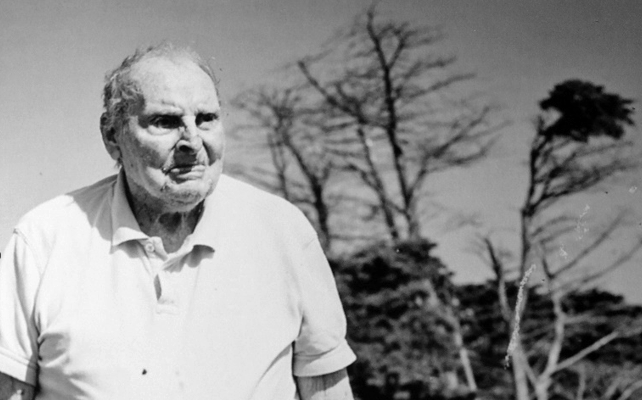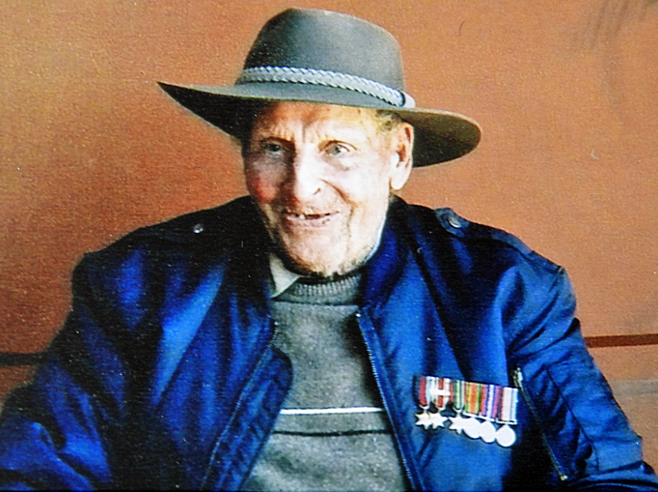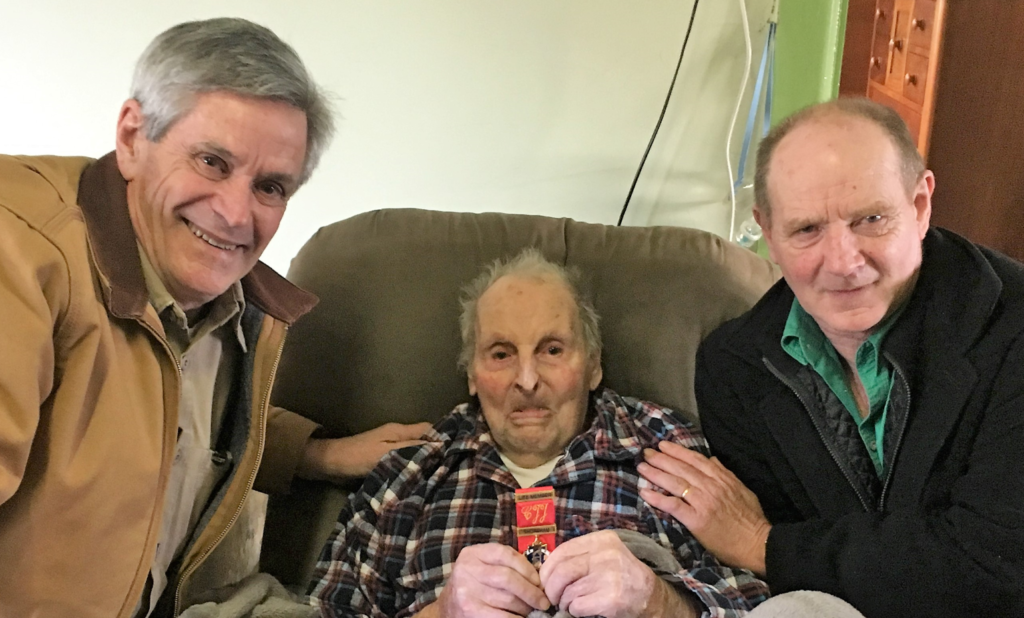
| Roles held: | Member 1949 – 2019 |
| Years of service: | 70 years |
| Awards: | Shoreham Life Member Award 2012 |
Early Life
Christie Johnstone was born on 17th February, 1920. He was educated at the Flinders State School from 1925 until 1933. With the exception of the time he served in the Australian Infantry Forces from 1941 – 1944, he always lived on the family farm, situated at the corner of Musk Creek Road and Frankston-Flinders Road. The eastern boundary is Manton’s Creek, the traditional boundary between Flinders and Shoreham. As such he was always part of both communities. Christie was a great grandson of local pioneer Henry Tuck (the first) and through his life was part of the fabric of the district.

As a young boy, Christie roamed across the paddocks, learning to fish in the creek and in the open sea, and to shoot – particularly foxes and rabbits. He walked over 3 kilometres to and from Flinders school each day.
The Young Farmer
Christie’s father Robert Johnstone passed away in 1937 and Christie (then aged 16) and his older brother Bill had to step up and work the farm. This involved rising at 5.00am every morning to milk the cows seven days a week and, after breakfast, they would be out on the farm ploughing paddocks and then sowing crops of rape, millet and maize for the summer and oats for the winter.
On 3rd September 1939, aged 19, Christie and his family gathered around the battery radio when Prime Minister Mr R G Menzies declared “we are now at war”.
It was army policy at the time not to recruit farmers unless they had an experienced replacement to maintain farming production. Christie was unable to find a replacement. Christie’s mother, Kate Johnstone (nee Tuck), had tough memories of loss and depravation from World War 1 as she suffered the loss of her only two brothers Henry Tuck (the third) and William Tuck as well as two of her cousins John Tuck and Henry Kennedy in the war. Understandably, she didn’t want her son Christie to volunteer.
War Service
Christie had a deep sense of duty to his mother and protective concern for his sister, but on balance felt he had a higher duty to serve his country.
In 1941, aged 21, Christie made his decision to volunteer for the army, within a month he was posted to the 8th Division and was in training at Puckapunyal. He was subsequently informed he was “volunteering” for Field Ambulance and in time joined the 9th Division and became a stretcher bearer. He served on various battlefields in Egypt, the Middle East and New Guinea. By mid-1944, food production in Australia was being seriously impacted by the war. Farmers were desperately needed. Christie was offered an early discharge to return home to the farm. He accepted with alacrity. In October, he was honourably discharged and came home to Shoreham … for good.
Married Life
Christie married Valma Cleave in 1951 at St Peter’s Shoreham where he had been a parishioner all his life. Christie noted it was only the second wedding there in 50 years as it was rather more fashionable to marry in Mornington than Shoreham.

Christie continued to farm his property, mainly by grazing cattle, improving his pasture and getting out on his tractor till the day he passed away on the farm which was part of one of the original Tuck allotments purchased by Henry Tuck (the first) for his son Henry Tuck (the second) in 1859. The property is still owned by his children Robert, Merlene, Colleen and Peter. Merlene lives and continues to graze cattle on the property today.

Flinders RSL and Two CFA Brigades
In 1947, Christie joined the Flinders RSL. He agreed (after some pressure) to take on the role of Branch Secretary, as a temporary role, until a permanent candidate was found. One was never found and he filled the role till his death. The photo shows Christie selling poppies in support of Remembrance Day.
Being positioned on the border of Flinders and Shoreham, Christie joined the Shoreham CFA as an inaugural member when it was formed in 1949, a unique position as he was already a member of the Flinders CFA.
Christie was awarded the first Shoreham life membership in 2014 at age 94 at the opening the new Shoreham CFA station.
Life Lessons
Malcolm Nicolson recalled at the presentation when talking to Christie he learnt two clear things:
- One the importance of being in tune with the environment. He recalled in his early days farmers managed the land. They understood the bush and the native grasses. They understood the climate, the weather and the seasons. And the farmers understood fire. They would burn a bit and beat it out with a branch, just enough at a time that you could manage. He acknowledged that the Boyds were more sophisticated, because they had leather beaters on poles.
- The second was the importance of community and what community means – shared need, shared activity, being apart but being together and sharing identity.
A third less philosophical learning was that Christie concluded he probably started more fires than he put out – sharing two specific events:
- There was a hedge fire when one of Christie’s burn-offs got into a cypress hedge. He whipped down to the fire station to get the tanker but couldn’t get in. So, he just hoped that the fire went out and it did.
- The second was an oats fire. In his early years, ploughing was done by horse. A horse can’t work on grass. It needs fuel and that fuel is oats, like a tractor needs diesel. Farmers would have 5 acres or so of oats for this purpose. One year, the Johnstone oats crop was wrecked by caterpillars. They were eating the plants but the seeds were falling on the ground. Christie had the onerous job of ploughing the crop in – by horse. It was proving impossible. Da Tuck suggested they burn the crop discreetly in the middle of the night. It was windy but Da reckoned that would get the job done all the quicker. Christie ploughed a firebreak around the crop. Christie recalled it burnt well, so well you could read a newspaper by the light. The fire crew was slow to respond. There was smoke everywhere but they couldn’t find the fire and gave up the hunt. Next day the black patch bore stark testament to what had happened. Nothing was said, but needless to say Da and Christie kept their heads down and didn’t go into town for a few days. Soon after it rained, the seed germinated and they had a great crop of oats.
Christie Johnstone OAM
Christie’s long and generous contribution to the community was recognised in 2012 when Queen Elizabeth II awarded him the Medal of the Order of Australia (OAM).

Whilst made a Shoreham Life Member in 2014, the CFA Brigade Life Membership medal was only created in 2015. Our photo (courtesy of Malcolm Nicolson) shows Malcolm (at left – Captain in 2014) and Roderick McKillop (right) presenting Christie with his Shoreham Life Membership Medal in July 2018.
Christie passed away on 21st February 2019 at 99 years of age. His memorial Service was held at St Peters Catholic Church, Shoreham. He was considered by both his communities – Flinders and Shoreham – as a treasure of our time and a link to our history.
The detail in this article was taken with permission from:
- “Christie” The wartime recollections of Christopher James “Christie” Johnstone OAM. Written by William (Bill) Clancy, AM. Published by the Flinders District Historical Society.
- Malcolm Nicolson’s article “Shoreham Rural Fire Brigade”. Local History News Issue 71 Summer 2015 – 2016. Published by Flinders District Historical Society Inc
Early pictures used were provided courtesy of Merle Johnstone, Christie’s daughter.
October 2022
